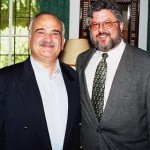Some religious Zionists, such as members of Gush Emunim (Bloc of the Faithful), a politico-religious movement established in 1974, view the withdrawal from Gaza as a direct challenge to their religious convictions and theological doctrines.
They believed the evacuation of 8000 Jewish settlers from the Gaza Strip was an unforgivable act of treachery and blasphemy on the part of the Israeli government, especially Prime Minister Ariel Sharon.
Followers of the Gush Emunim ideology upheld for generations that the settlement of Jews throughout the “Biblical Land of Israel”, including “Judea and Samaria” (the Biblical names of the West Bank), was a religious duty ordained by God.
Since then, the movement spearheaded the settlement drive in the West Bank and Gaza Strip, benefiting from large sums of money made available by successive Israeli governments and wealthy Jewish donors, especially in North America.
Other Zionist groups, including the younger generations of religious youth, who were told by rabbis such as Avraham Shapira, that God would intervene at the last moment and foil the withdrawal, are now facing a traumatic period of self-analysis.
Shapira is head of Mercaz Harav, a Talmudical college, in west Jerusalem.
News
Israeli Zionists ponder next move
Israel’s recent withdrawal from the Gaza Strip has given rise to fierce ideological debate among the followers of religious Zionism.
Many religious Zionists were distraught over the Gaza pullout
By Khalid Amayreh
Published On 2 Oct 20052 Oct 2005
Some religious Zionists, such as members of Gush Emunim (Bloc of the Faithful), a politico-religious movement established in 1974, view the withdrawal from Gaza as a direct challenge to their religious convictions and theological doctrines.
They believed the evacuation of 8000 Jewish settlers from the Gaza Strip was an unforgivable act of treachery and blasphemy on the part of the Israeli government, especially Prime Minister Ariel Sharon.
Followers of the Gush Emunim ideology upheld for generations that the settlement of Jews throughout the “Biblical Land of Israel”, including “Judea and Samaria” (the Biblical names of the West Bank), was a religious duty ordained by God.
Since then, the movement spearheaded the settlement drive in the West Bank and Gaza Strip, benefiting from large sums of money made available by successive Israeli governments and wealthy Jewish donors, especially in North America.
Other Zionist groups, including the younger generations of religious youth, who were told by rabbis such as Avraham Shapira, that God would intervene at the last moment and foil the withdrawal, are now facing a traumatic period of self-analysis.
Shapira is head of Mercaz Harav, a Talmudical college, in west Jerusalem.
The withdrawal so challenged Zionist ideals that settler rabbis and community leaders such as Zvi Hendel compared the evacuation of the Gaza settlers to the Holocaust.
Trauma
According to Gershon Baskin, a co-founder of a Palestinian-Israeli peace centre, many messianic settlers see the withdrawal from Gaza as an “invalidation of their religious beliefs”.He predicted that many settlers would be demoralised, while others might commit suicide. By the second week of the withdrawal, two settlers – a man and a woman – had separately set themselves on fire and died in protest.
On 11 September, Radio Israel also reported that a soldier had apparently killed himself in the Gush Katif settlement. Israeli media said the soldier was distraught over the withdrawal from the settlement.
“I remember that when (former Israeli Prime Minister Yitzhak) Rabin sought to vacate them from Hebron after the mosque massacre in 1994, he was advised by an expert that they would commit mass suicide like Masada, and that made Rabin change his mind.”
In 73 CE, about 1000 Jewish rebels and their families who had rebelled against the authority of Rome committed suicide rather than surrender to the Roman army.
Asked what he thought the settlers would do to make up for their “losses” in Gaza, Baskin said they would likely seek to provoke and attack the Palestinians.
“They will lick their wounds and try to put up a determined stance to prevent any further withdrawal in the West Bank.
But some religious Zionist leaders and activists deny they are facing a crisis of faith.
“There is indeed a trauma, the disengagement was very painful. But we are a people who have not succumbed to inquisitions, pogroms, expulsions, and holocausts, so we will not succumb to this,” said a settler leader named Ash.
He told Aljazeera.net that he was convinced the religious Zionist movement would emerge stronger than before.
Historical mistake
David Ha’ivri, an activist in the Revava ultra-religious grassroots organisation, told Aljazeera.net the fundamental goals of religious Zionism, namely the creation of a religious Jewish state that would lead to the redemption of the Jewish people, remained unchanged despite the Israeli withdrawal from Gaza.
However, Ha’ivri recognised that religious Zionism made a historical mistake by allying itself with secular Zionism.
“I think we as religious Zionists made a historical mistake by entering into an alliance with secular Zionism from the very inception.
“I am not saying that secular Zionism has not done anything worthwhile; I am saying that they have finished their mission.”
Ha’ivri said the Israeli withdrawal from Gaza was not the only issue behind the evolving showdown with the secular state.
“We are not against the state merely because of the uprooting of Jews from Gaza. This state and its supreme court are hostile to everything Jewish, they allow the sale of non-kosher food and show no respect for the sanctity of the Shabath [Sabbath].”
More Jewish, less Zionist
Alexander Yakobson, professor of history at the Hebrew University, believes that some “fringe elements” of religious and messianic Zionists might eventually try to assassinate Israeli Prime Minister Ariel Sharon.
“They could do one of three things, either assassinate Sharon, or attack the Dome of the Rock, or commit some dramatic bloodshed against the Palestinians.”
Yakobson believes many religious Zionists will ultimately move away from the “secular establishment,” including the Likud party, and move closer to the Haredi, (also known as Charedi) non-Zionist orthodox community who believe their religious practices originated with the divine revelation of the Torah to Moses on Mount Sinai.
This view is supported by veteran religious Zionist leader Yohanan Ben Yaccov who was quoted in a Ha’aretz article on 27 August, as saying: “On the axis between Jewishness and Israeliness, we have to turn more in the Jewish direction, to conduct a dialogue with the Haredi community, even at the expense of the dialogue with the liberal-democratic elite.”
However, it is unlikely that the Haredi community will give an unconditional welcome to disenchanted religious Zionists.
“The disengagement shows how much the religious Zionists were mistaken. For ages, these people worshipped a secular state which is not based n Jewish and Torah ideals. This is their mistake, and I hope they will learn their lesson,” said Ben Moshe, a Haredi activist from West Jerusalem.
“[At] the end of the day, the disengagement proves that Judaism and Zionism are incompatible. One can’t be a true Jew and Zionist at the same time,” he told Aljazeera.net.
Alienation
Ya’er Sheleg, an Israeli journalist sympathetic with the settler movement, believes the withdrawal from Gaza will have an effect on the emotional state of religious Zionist youths.
“It can be assumed that they will head toward passive alienation, a reduction in the spirit of volunteerism in favour of assimilation by means of the domestic couch potato culture.”
However, Sheleg believes that in order to survive and compete for the hearts and minds of the Israeli public, religious Zionists would have to adopt a more rational and non-mythical analysis of reality.



